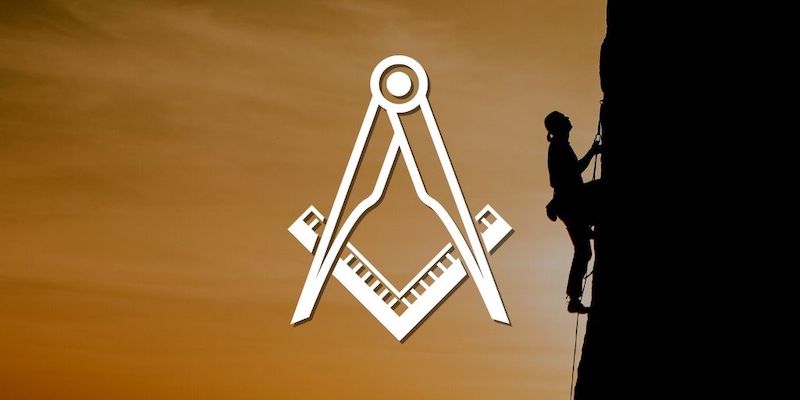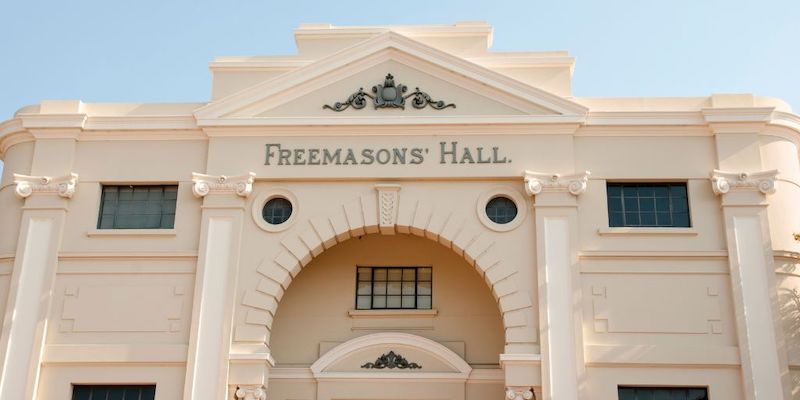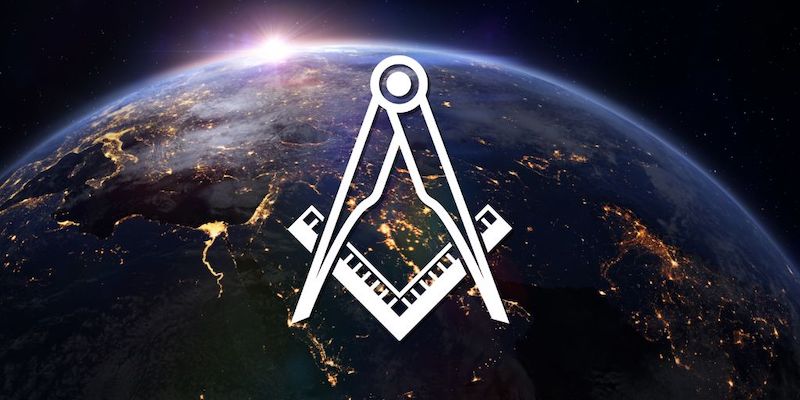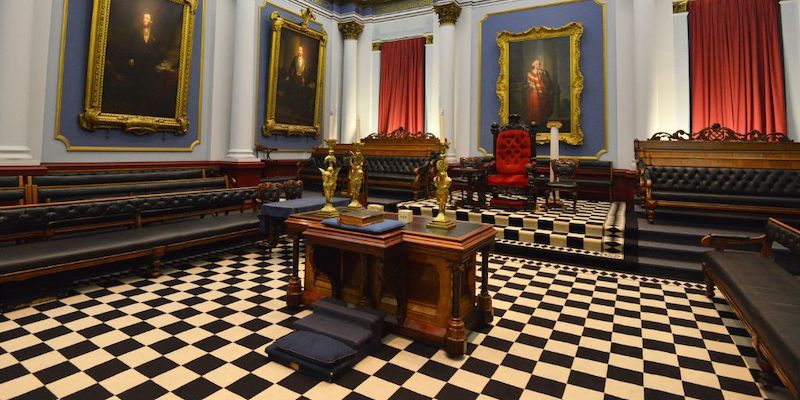Freemasonry, a historic and influential fraternal organization, has faced several challenges in recent years.
One significant issue is the decline in membership numbers, a trend that can be attributed to various factors, including Americans joining clubs and fraternities less frequently than in the past.
This decline is impacting not only the strength of the organization’s network but also its ability to perpetuate its influence and values.
Drawing from concerns expressed by our Twitter followers, another challenge mentioned is the organization’s struggle to adapt to changes in the modern world while maintaining the tradition and values that have defined Freemasonry for centuries.
The organization must find a balance between remaining true to its roots and embracing change without succumbing to external pressures from the evolving societal landscape.
In the age of digital communication and secularism, Freemasonry faces the task of staying relevant in a rapidly changing world where membership dynamics and values are shifting.
In this article, we explore the hurdles and obstacles that Freemasonry encounters in today’s modern world.
From declining membership and changing demographics to adapting to technological advancements.

Challenges in Membership and Society
| Year | Number of Freemasons (USA) |
|---|---|
| 1950 | 4,103,000 |
| 1955 | 3,457,000 |
| 1960 | 3,142,000 |
| 1965 | 2,699,000 |
| 1970 | 2,495,000 |
| 1975 | 2,287,000 |
| 1980 | 2,055,000 |
| 1985 | 1,917,000 |
| 1990 | 1,729,000 |
| 1995 | 1,628,000 |
| 2000 | 1,870,000 |
| 2005 | 1,582,000 |
| 2010 | 1,314,000 |
| 2015 | 1,161,000 |
| 2020 | 1,055,000 |
NB: Please note that the numbers provided may not be exact. It’s always advisable to consult official sources or Masonic organizations for the most accurate and up-to-date information.
Decline in Membership
In the 21st century, Freemasonry has faced a (steep) decline in membership, believed to be symptomatic of the overall decline in voluntary associations rather than a problem specific to the fraternity itself.
Changing Societal Values
Freemasonry is not immune to the broader changes in societal values that have led to shifts in the priorities of individuals.
The organization has faced challenges in adapting to these new expectations and needs. As new generations join, Freemasonry must find ways to keep its core principles relevant to an ever-evolving society.
Integration of Women
Historically, Freemasonry has been a male-only institution, although separate women’s Masonic organizations have existed.
The integration of women into the lodges has been a challenge to the traditional structure and values of Freemasonry, prompting the fraternity to reevaluate its practices and adapt to an increasingly diverse membership base.
Perception of Secrecy
One of the most prominent challenges facing Freemasonry today is the perception of secrecy surrounding the organization.
This perception has led to widespread misconceptions, suspicion, and distrust fueled by conspiracy theories.
Freemasonry must continue to work on fostering transparency and educating the public to dispel these misconceptions and build trust in its humanitarian pursuits and commitment to personal growth.
Evolution of Tradition and Philosophy

Influence of Modern Society
As Freemasonry faces the challenges of the 21st century, one of the key factors shaping its evolution is the influence of modern society.
The once-secretive and influential organization has experienced a shift in perception, as many of its traditions are now easily accessible with a simple Google search.
This has led to a change in the way society views and interacts with Masonic organizations.
As societal values and expectations evolve, so too must the teachings and practices of Freemasonry.
The organization’s commitment to morals, ethics, and personal development remains central to its identity, however, the increased emphasis on diversity and inclusivity in modern society has brought about notable changes in membership demographics.
Adapting Masonic Teachings
Historically, Freemasonry was an exclusively male fraternity.
However, certain traditions, such as Co-Freemasonry or Le Droit Humain, now admit both men and women into their ranks.
This evolution in membership reflects the organization’s commitment to adapting to the changing societal landscape.
Additionally, the use of technology has created new avenues for exploration and study within the field of Masonic research.
From online resources (such as our own Freemasons’ Community) to virtual gatherings, Freemasonry is leveraging technology to reach a wider audience and foster connections within its membership.
Philosophical Purpose and Modern Relevance
Despite the changes in its practices and demographics, the core philosophical purpose of Freemasonry remains the same:
The pursuit of personal development, moral growth, and the promotion of ethical values.
However, the organization must contend with the shifting perspectives on religion, spirituality, and the place of fraternal organizations in modern society.
In a time where the importance of community and unity is ever-present, Freemasonry must continue to evolve and adapt its teachings to maintain its relevance and convey its timeless values to a new generation.
By embracing the challenges posed by modern society, the organization has the potential to not only survive but thrive in the 21st century.
Technological Adaptation and Operational Precepts

Impact of Technology
The advent of technology has had a notable impact on Freemasonry, similar to its effects on numerous organizations in the 21st century.
Historically, Masonic lodges have relied on traditional operational precepts and face-to-face interactions to promote their vision and teachings.
However, with the rapid evolution of technology, lodges are increasingly realizing the need to adapt and embrace these modern tools to ensure their relevance in today’s connected world.
Updating their methods and engaging with technology has the potential to broaden their reach and maintain a strong presence in today’s environment1.
Masonic Online Communities
One way Freemasonry is adapting to technology is by establishing a presence in online communities.
As the digital landscape continues to expand, Masonic online communities can serve as a valuable platform for lodges to interact and share knowledge, experiences, and perspectives with fellow Freemasons across the globe.
These digital platforms can enable Grand Lodges to communicate more effectively and collaborate on projects, overcoming geographical and cultural barriers that may have hindered their progress in the past.
Furthermore, online communities can foster camaraderie and growth among members, allowing Freemasonry to remain interconnected in an age of social distancing and remote work.
Modernizing Lodge Operations
The integration of technology into Masonic lodges is essential for modernizing their operational precepts.
With the increasing reliance on digital tools in daily life, it is imperative for lodges to adapt and optimize their processes, leaning on technology for communication, organization, and even ritualistic practices.
Utilizing digital tools can enhance efficiency and streamline processes, allowing lodges to better adapt to the changing environment and maintain their significance in the 21st century.
Challenges in Leadership and Stability

Maintaining Integrity
One of the key challenges Freemasonry faces today is maintaining its integrity.
The organization’s influence in stable societies has become less than it once was due to the evolutionary change that has occurred within these societies (source).
Additionally, there are concerns about the willingness of some Masonic leadership to grant recognition to bodies that do not follow the same protocols.
This can potentially undermine the core principles and standards of Freemasonry.
Effective Communication
Clear and efficient communication plays a critical role in the leadership and stability of any organization, including Freemasonry.
Today’s technologically advanced and globalized world presents new challenges and opportunities in this regard.
It is essential for the organization to understand and adapt to modern communication tools and techniques in order to effectively convey its messages and values.
Character and Leadership Development
Another challenge for Freemasonry in the 21st century is the development of strong leaders with high moral character.
As society continues to evolve, Master Masons must ensure that their leaders are well-prepared to guide the organization through these changes.
This can be achieved through continuous education, mentorship, and fostering a culture of personal growth within the membership.
Developing leaders with strong character, integrity, and vision will contribute significantly to the stability and future success of Freemasonry within an increasingly profane world.